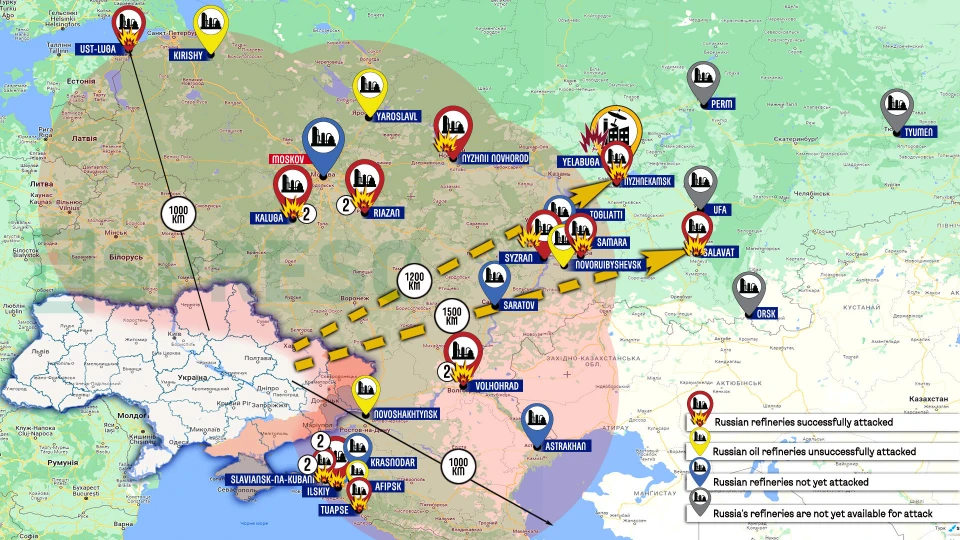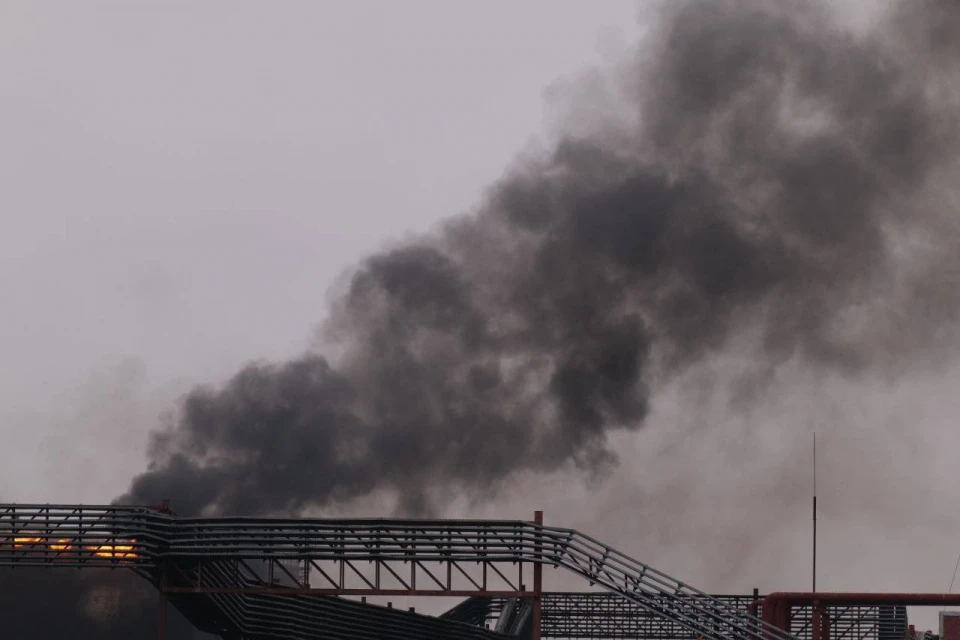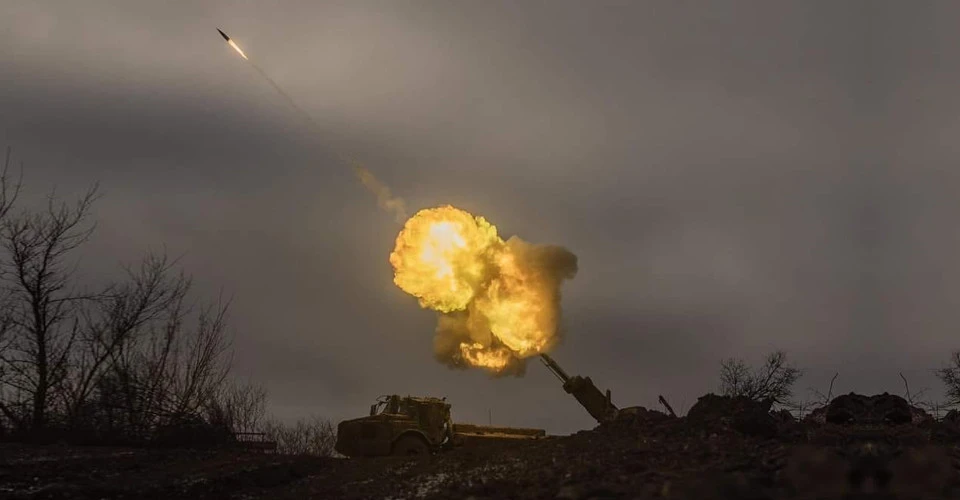
Engels oil depot fire, drone strikes in Leningrad, Tatarstan: weekly recap of attacks on Russia
Last week, Russia faced numerous fires, including the prolonged blaze at an oil depot in Engels. Fires caused by UAVs also reached the Leningrad region and even Tatarstan
Learn more about the "booms" in Russia and the temporarily occupied territories in Espreso's weekly review.

Massive fire at Engels oil depot, blazes in Leningrad, Tatarstan
- On the night of January 8, a drone attack was reported in the Russian city of Engels, located in the Saratov region. The Ukrainian defense forces struck the Russian fuel storage base Kristal. According to Ukraine's General Staff, this oil depot supplied fuel to the Engels-2 military airfield, where Russian strategic aviation is based. "The damage to the oil depot creates significant logistical problems for the strategic aviation of the Russian occupiers and significantly reduces their ability to strike peaceful Ukrainian cities and civilian objects," the Ukrainian Armed Forces added. Local residents also reported that after the UAV attack, the oil depot was burning, and they had to go to basements during the air raid alert. On January 11, Roman Busargin, head of the Saratov region, reported that the fire at the oil depot had been burning for four days. However, he mentioned that the fire area "at industrial enterprises" (the oil depot at the Engels-2 military airfield) had decreased by 80%. The amount of smoke had also reduced.
- On the night of January 10, drones once again attacked several regions of Russia. After explosions in Gatchina, Leningrad region, a large fire broke out in an industrial zone covering 1,600 square meters. Local residents reported continued detonations. Nearby, there is the Ingria Tech enterprise, which sells panel coatings and paint products. The area also hosts the Admiral fish processing and canning company and the Gatchina SSK, which manufactures panels for residential and administrative buildings. Additionally, in the Rostov region, the PlastFaktor factory caught fire as a result of the attack. Acting Governor Yuri Slyusar stated that in the village of Kryukov, Kuybyshev district, several buildings were damaged by the fall of a drone: glass was shattered, and the facades and roofs of seven residential houses and a school were damaged. In the village of Krym, a production facility caught fire, most likely the PlastFaktor plastic factory. As of 07:13 a.m., the fire covering an area of 2,000 square meters was extinguished.
- Also, on the night of January 10, a Neptune missile and UAVs from the Security Service of Ukraine (SBU) attacked a Russian ammunition and reconnaissance drone storage facility in the Rostov region. According to sources, the SBU drones first overloaded the Russian air defense, then attacked Russian storage with a Neptune missile. "Together with the Ukrainian Navy, the SBU struck a critical target – a storage facility with reconnaissance drones that guide Russian strikes on Ukrainian cities and the front line. Now, there will be fewer of these Russian 'birds' in the sky. Operations against military targets behind enemy lines will continue," the source said.
- On January 11, reports emerged from the Russian cities of Anapa, Novorossiysk, and the Voronezh region about a supposed drone attack, with claims that air defense systems were operating. In Krasnodar Krai, authorities announced the activation of the alert system due to the air defense activity. Additionally, the city administration issued a notice banning filming of drones. Ateo Breaking reported explosion sounds in the city. Explosions and air defense activity were also reported in Novorossiysk. Prior to this, the governor of the Voronezh region, Alexander Gusev, warned local residents about a possible drone attack but later clarified that no damage occurred. However, acting governor of the Tambov region, Yevgeny Pervyshov, stated that drones allegedly crashed into two apartment buildings in Kotovsk. He mentioned that several people were reportedly injured by glass shards, but there were no fires and only minor damage to the buildings.
- Information has also surfaced online about a fire allegedly breaking out during an air raid alert in the city of Nizhnekamsk, in the Russian Republic of Tatarstan, due to a alleged drone attack. However, the authorities denied rumors of a fire. Still, employees at the TANEKO oil refinery, one of the largest in Tatarstan, were evacuated. The refinery processes about 16.2 million tons of oil annually. Meanwhile, Tatarstan authorities denied the fire reports. In an official statement, it was clarified that the evacuation was carried out according to a pre-established protocol in case of an alert to ensure employees' safety. It was also mentioned that the video showing bright lights was related to the operation of torches, not a fire. Earlier in the day, the company announced planned changes to the equipment's operational mode.

Attack on Russian command center in occupied Svitlodarsk
On Friday, January 10, the Armed Forces of Ukraine delivered a precision strike on the command post of the 3rd Army Corps of the Russian Armed Forces in the temporarily occupied Svitlodarsk, Donetsk region. Ukraine's General Staff also noted that throughout last week, the Ukrainian Armed Forces launched a series of strikes on objects captured by Russian forces in the Donetsk region. "All necessary measures were taken to avoid risks to the civilian population," the General Staff added.

Expert insights
Military expert at Defense Express, Ivan Kyrychevskyi, believes that the strike by the Ukrainian Defense Forces on the fuel depot in Engels was aimed at disrupting a potential Russian strategic aviation strike on Ukrainian territory. The expert noted that destroying the Engels airbase could indeed thwart Russian plans, as bombers require a large amount of fuel.
"According to information disseminated by Russian monitoring channels, several Tu-95MS bombers were reportedly stationed at the Engels airbase, prepared for a missile attack on Ukrainian territory. Unfortunately, it is impossible to confirm or refute this information based on satellite images. The strike on the oil depot in Engels was not symbolic but countered our undue pessimism. Leading up to December 31, there was much talk of Russians attacking Ukraine on New Year’s Eve. The opposite happened: Ukraine struck Russian strategic aviation. I am inclined to believe that the strike on the oil depot in Engels was an attempt to disrupt a Russian strategic aviation strike on Ukrainian territory," he explained.
Meanwhile, military expert and development director of the Defense Express media and consulting company Valeriy Ryabykh stated that hitting the fuel depot in Engels, which supplied critical fuel for Russian strategic aviation aircraft, is a significant blow to Russia.
"The Engels oil depot and the Engels-2 air base are interconnected. The oil depot is a subdivision of the so-called Rosrezerv and is called Kristal. It provides fuel for Russian strategic aviation aircraft," Ryabykh noted.
- News











































